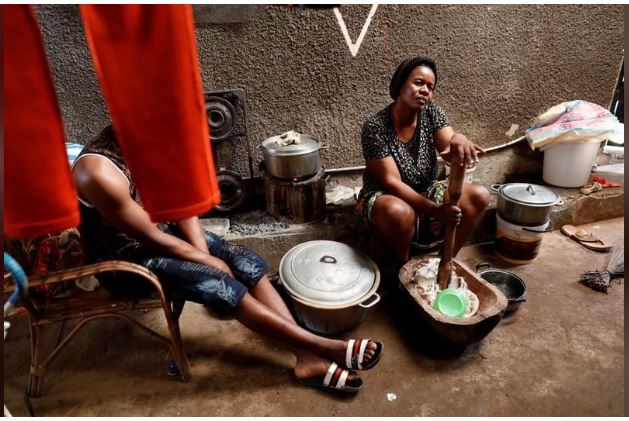It was the nine corpses left by the roadside after a gunfight that made Honrne Waba flee her village in Northwest Cameroon in May and hide in the bush.

When weeks later she learned that her house had been burned down with all her belongings inside, she decided to leave the region altogether.
“I felt so scared, I had a broken heart and I said I had to leave,” Waba, 40, told Reuters in the narrow courtyard of her daughter’s house in the capital Yaounde, where she has been staying for a month since leaving her home village of Njinikom.
Waba is one of tens of thousands of Cameroonians displaced by a separatist insurgency in the English-speaking Northwest and Southwest regions who find themselves without a home and with nowhere to vote in Sunday’s presidential election.
Even those still in Anglophone areas will struggle to reach a ballot box: armed separatist groups have vowed to stop the election from happening there, potentially silencing up to five million English-speaking voters in the majority French-speaking country of about 24 million.
The chaos in Anglophone opposition strongholds may help Cameroon’s 85-year-old President Paul Biya, who is expected to easily win a seventh term to extend his 36 years in office, aided in part by a weak opposition and a resigned population, many of whom view elections as a means to rubber-stamp seven more years of Biya.
Victory would leave Biya as one of Africa’s last strongmen, vestige of a post-colonial era that a wave of democracy has slowly eroded. During his tenure, neighbouring Nigeria has had nine different presidents; the only current African president to have ruled longer is Equatorial Guinea’s Teodoro Obiang Nguema Mbasogo.
The level of neglect across Cameroon has caused a “groundswell of discontent” directed at the president, said opposition candidate Akere Muna. However, if Anglophones cannot vote “the irony is that the secessionists may be helping Biya”.
In the Simbock neighbourhood of Yaounde, where small concrete houses creep haphazardly up one of the city’s many lush, steep hillsides, displaced Anglophones say they have more pressing concerns than who will win the election.
Waba brought her voting card with her from the Northwest, but four days before the election she was not registered to vote in Yaounde and was unsure if it was even possible.
She is more worried about how to make ends meet now that she cannot sow corn, beans and other vegetables at her farm at home.
“We are not managing very well in Yaounde. Food is very expensive. I sleep on the floor now,” said Waba as she prepared a cloudy cow-skin broth over a charcoal stove. “I used to do my farming, I used to send my children to school.”
NOT ENOUGH ROOM
It is unclear how this kind of hardship will play out at the ballot box.
Biya rules the cocoa- and oil-producing country essentially by decree. His popularity has been largely unaffected by the long stretches he spends abroad in Swiss hotels with his fashion-conscious wife, Chantal, whose flamboyantly coiffed strawberry bouffant has made her instantly recognisable.
He is still considered by many as the “force of experience” touted by election campaign posters across the capital.
Still, the Anglophone crisis is his gravest threat yet. What began as a peaceful movement in 2016 calling for broader recognition of Anglophone teachers and lawyers has opened a deep wound in Cameroon.
For ten years after the French- and English-speaking regions joined together in 1961, the country was a federation in which the Anglophone regions had their own police, government and judicial system.
Since then, Anglophone autonomy has declined and English speakers have felt marginalised. Today, the governors of the Southwest and Northwest are Francophone, as are prefects of most English-speaking districts.
A government crackdown on protests against the marginalisation of Anglophones since 2016 has killed dozens, bolstering support for radical elements calling for secession.
Soldiers went into remote Anglophone villages, burning houses and killing residents, witnesses told Reuters. In retaliation, hundreds have taken up arms to form small militias, killing hundreds of soldiers and gendarmes.
The military denies using excessive force and accuses the separatists of terrorism.
“It is the separatists in this crisis who have gained most prominence and not enough room has been left for moderates,” said Simon Munzu, a former United Nations official who has called for dialogue between the two sides.
YOU HEAR GUNSHOTS
Displaced Anglophones in Yaounde all agree on one thing about the life they have fled: they were sick of the shooting.
“You can be walking along, you hear gunshots and you see people running. You get inside, you dive on the floor,” said 55-year-old Kum Rose, who in August left Bomaka in the Southwest, taking the bus with four children and 7 grandchildren.
She managed to bring some pots, charcoal and palm oil for cooking but the tiny room where she sleeps with her whole family in a rundown house in Yaounde is no substitute for home. Rose proudly showed her voting card, kept dry in a red holder, but admitted she had no idea where to register in Yaounde.
Musician Rawlings Fofeyen, 23, left the Northwest city of Bamenda two weeks ago. He said the Cameroonian military routinely picked up young men on the streets, suspecting them of being separatist fighters.
His money dried up when friends stopped coming to his studio to record music. He felt he could no longer stay when he saw a dead body in his neighbourhood last month.
“I have some friends who have gone and who I never saw again,” he said.
Bamenda has gone quiet, he said. Public spaces and markets are empty.
“We used to be a happy people, very welcoming,” he said, holding back tears. “Now we don’t trust anybody.”
Additional reporting by Josiane Kouagheu in Douala; Editing by Giles Elgood

